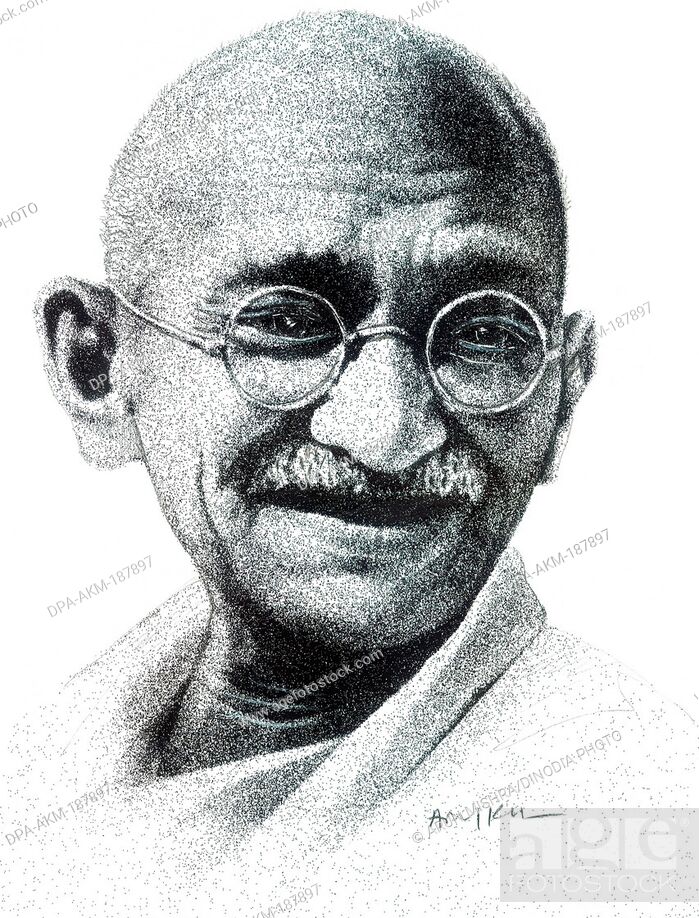- Full Name Mohandas Karamchand Gandhi
- Born 2 October, 1869
- Place of Birth Porbandar, Gujarat
- Death 30 January, 1948
- Place of Death Delhi, India
- Cause of Death Shot by Gun or assassination
- Father Karamchand Gandhi
- Mother Putlibai Gandhi
- Nationality Indian
- Spouse Kasturba Gandhi
- Children Harilal Gandhi, Manilal Gandhi, Ramdas Gandhi and Devdas Gandhi
- Professions Lawyer, Politician, Activist, Writer
When I despair, I remember that all through history the ways of truth and love have always won. There have been tyrants, and murderers, and for a time they can seem invincible, but in the end they always fall. Think of it–always.”
– Gandhi
Introduction
Mohandas Gandhi was a leader of India’s independence movement. When India was a colony of Great Britain, Gandhi used nonviolent methods to protest against British rule. His efforts earned him the title Mahatma. Mahatma means “great soul.” In India, he is known as ‘Father of the Nation’.
Early Life
Mohandas Karamchand Gandhi was born on October 2, 1869 in a Gujarati family. His birthplace is Porbandar (also known as Sudamapuri). He is the fourth and youngest son of Karamchand Gandhi and Putlibai. He has 2 elder brothers and 1 sister. At the age of 13 years, Mohandas Gandhi was married to a 14-year-old girl, Kasturbai Makhanji Kapadia. Mohandas and Kasturba had four sons: Harilal, Manilal, Ramdas, and Devdas.
Education
Mahatma Gandhi studied law from London and returned to India in June 1891. After his inability to cross-examine witnesses, he moved to South Africa to be a lawyer. During his 21 years of stay in South Africa, he developed political views.
In South Africa
In 1893 Gandhi took a job in a British colony in South Africa. There he saw Europeans mistreating Indian settlers. He got into politics to fight for Indian rights.
Gandhi first used his method of nonviolent protest in 1906. He told Indians that they should not obey British laws that they thought were wrong. He also said they should stay peaceful no matter how they were punished for their actions. This new method of protest became known as Satyagraha, or “devotion to truth.”
Protests in India
Gandhi returned to India in 1915. Within a few years he became India’s most powerful political leader. He led major protests in 1920–22, 1930–34, and 1940–42. Gandhi’s followers stopped using British goods. They refused to enter British courts and schools. In 1930 Gandhi led a protest against a British tax on salt. He led Indians on a march to the sea to collect their own salt. Gandhi was sometimes jailed for his actions.
Independence
Gandhi was imprisoned for two years during World War II. He and other Indian leaders had demanded immediate independence as India’s price for aiding Britain in the war. After he was released, Gandhi continued to work for independence.
India finally won its independence in 1947. It was a great victory for Gandhi. But he was disappointed because India’s land was divided into two new countries: India and Pakistan. Before and after India’s division, the country was torn by clashes between Hindus and Muslims. Gandhi tried to make peace. On January 30, 1948, in the city of Delhi, he was shot and killed by a Hindu man.
Place in History
Gandhi was one of the greatest political and social leaders in the 20th century. His use of nonviolent protest eventually led to his country’s independence. Within his country, he supported the rights of both Hindus and Muslims. He also sought better treatment for groups everyone else looked down upon.
Gandhi was admired by many influential people of his day and beyond. Albert Einstein, one of the greatest geniuses in the history of science, deeply admired Gandhi. Many others who have fought for equality and justice were inspired to follow the path forged by Gandhi. Martin Luther King, Jr., learned about Gandhi’s philosophy of nonviolence and used it to win victories for the civil rights movement in the United States.
Source:-https://www.britannica.com/biography/Mahatma-Gandhi

No comments:
Post a Comment
Thank you!
Your comment will be published after admin approval.